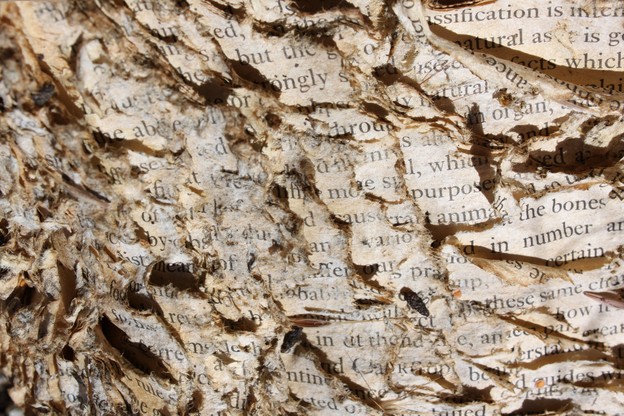The book as/in nature ...

Stephen Collis and Jordan Scott, Decomp (Coach House Books, 2013), 135 pp. $24.95 CAN, $22.00 USA—Full disclosure: I am quoted toward the end of this book and cited in the notes. The introduction by Jonathan Skinner sets up one of the central issues addressed in this collection of poems, prose and photographs: “How did we get from some bodies to somebody? Decomp takes the text best known for exploring this question, Darwin’s On the Origin of Species, and subjects it to an experiment to find out how we get from somebody back to some bodies.” The experiment was ostensibly simple: Collis and Scott placed five copies of Species in five distinct ecosystems in British Columbia and left them there for a year before returning to document — via photographs and their own ruminations — what remains. The result is organized according to specific principles. Each section is dedicated to a specific ecosystem which is identified by name (e.g., Selections from the Englemann Spruce Subalpine Fir Zone, Kootenay Lake) and, after the photographs, latitude and longitude (e.g., “49°44’514”N/116°W”). Each section opens with close-up, near microscopic, photographs of Darwin’s text in its immediate “natural” environment. Then the ruminations begin, cast in poems and prose, among which is a “box” deemed the “readable,” an apparent reference to whatever portions of Darwin’s text remains legible after a year of exposure to the climate. Each section has specific references to a number of philosophers (the usual suspects — Nancy, Blanchot, Deleuze and Guattari, etc.) but also, later in the book, to friends who accompany Collis and Scott and offer their own commentaries on the project. For example, Ken Belford wonders “what kind of new affinity of the attentions it would take to notate a decomposing text located within the allness of everything that is, that Collis and Scott did not regulate or control.” If this sounds very Olson-like it is hardly surprising since space, the “immensity” of the forest, in relation to the microscopic, complicates as it enables awe and humility. Collis and Scott cite Holbrook Jackson’s observation that Darwin had “no respect for books,” often tearing them in half to make them more manageable. At the same time, Darwin’s view of natural change was colored by his vocabulary of “improvement,” if not development. In brief, Darwin's rejection of the integrity of the book is re-enacted here by Collis and Scott insofar as the various sections of Decomp could be severed from each other and read separately. Though nothing said about Darwin here distinguishes him from almost every other significant 19th century American writer and thinker, including Whitman and Emerson (but not Dickinson or Douglass), the gendered, if not ethnic/racial, ramifications of the human vis-à-vis the natural are perhaps as much to the point as the question of ecological change. In this regard the gradual disappearance of text from the ‘readable’ is not insignificant. Whereas in Phil Metres’ Abu Ghraib Arias the disappearing text registers the silencing of “other” voices, here it suggests, or perhaps tempts one to, eschatological thinking. To their credit Collis and Scott sidestep this trap though, in doing so, they wander into the vocabulary of Wordsworth and the Shelleys:
Dear Reader. We calm the waves that are particles that are waves that are rolling through matter quantum and gathered now near this word sou, the re being of bodies, the earth unre able….Say natural processes are in fact figures too. Even the monstrous wordlessness we abode by here, no feedback, gaping maw…The book is buried and we cannot read a thing…
For all that, because of all that, the Romantic gesture par excellence, Decomp remains as open to its future readers as those copies of On the Origin of the Species in the various ecosystems. For in "recovering" the copies of the book after a year Collis and Scott could not have recovered all of the texts. Some residue, some remainder, found its way into , as part of, those systems. What could not be returned to culture, to another book (the photographs in Decomp) as the "ghosts" of themselves, are heretofore "readable" in another sign system. Eschewing the pitfalls of progress (but not, as the “Readable” boxes signal, decline), Decomp is a multi-genre, compelling witness to its, and our, futures which, at least for a while, remain plural.
Hunches, hedges, etc.